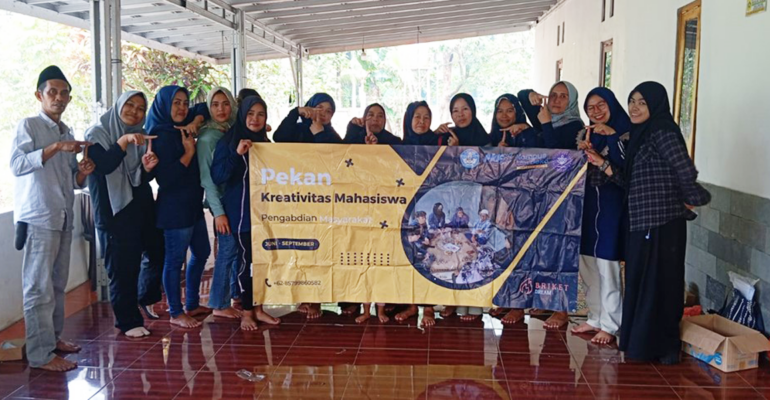Carbonization Barrel, IPB University Student’s Program in Environmentally Friendly Agricultural Waste Processing

IPB University students involved in the Student Creativity Program in Community Service (PKM-PM) implemented the Carbonization Keg program. This activity was carried out to reduce agricultural waste which is abundant every harvest time as an effort to empower the community of Cimayang Village, Bogor, West Java.
One of the series of activities was training in making charcoal briquettes which is also the core of the Carbonization Barrel program. According to team leader, Imawati Dwi Kartika, this training was designed to provide direct understanding and application regarding making charcoal briquettes from agricultural waste using carbonization vats.
“PKK women were introduced to various existing programs. The delivery is made simple and directly involves making charcoal briquettes. They were also given the task of being creative in making their own charcoal briquettes for the next activity,” said Ismawati.
Meanwhile, Fathonah, one of the PKM team members, said that this core activity was very important. This is because, by directly instilling the correct process for making charcoal briquettes, people will be enthusiastic about utilizing existing agricultural waste.
“The PKK women of Cimayang Village have good knowledge, and after this training activity, they are enthusiastic and curious about other waste that can be used to make charcoal briquettes. This must continue to be accompanied and maximized so that activities can be sustainable and the abundance of agricultural waste can be reduced,” explained Fathonah, member of the PKM team.
Ika Satyasari, an environmental activist with the Detara Foundation, is proud of the presence of this program. He hopes that this program can continue and be developed to achieve energy independence in the future. “I’m also proud of the students at the Faculty of Forestry and Environment (Fahutan) IPB University in their efforts to assist the community in Cimayang Village,” he said.
According to him, the assistance provided by IPB University students encourages society towards agriculture and a circular economy. Through this program, students can express their ideas in preserving remaining biomass in agricultural production of cassava and corn commodities as renewable resources.
“Hopefully the agricultural waste carbonization barrel program will be a combination of community empowerment programs and scientific research in the field of renewable energy. This is because, according to the Ministry of Energy and Mineral Resources (ESDM), our estimated natural gas reserves are only around 16-19 years away. “Charcoal briquettes produced from the carbonization of agricultural waste will hopefully provide a solution for rural communities in energy independence,” he said. (*/Rz) (IAAS/SND)



